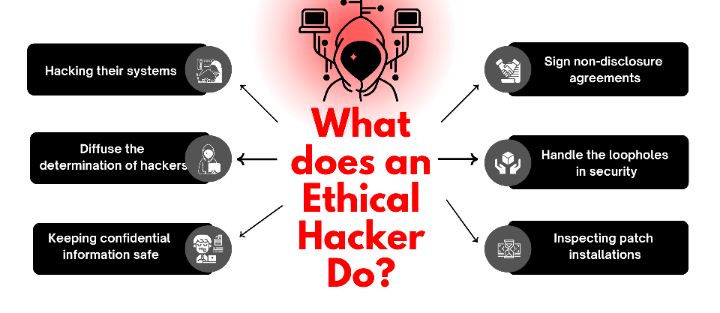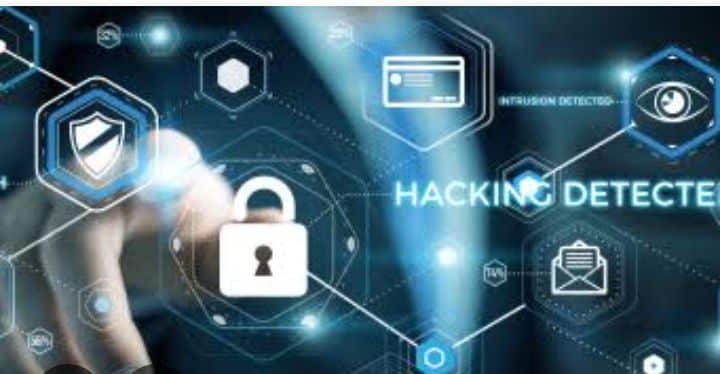Introduction
In the digital age, the internet is both a marvel and a minefield. As businesses, governments, and individuals rely more on digital systems, the importance of cyber security has grown exponentially.
Cyber attacks are no longer just the work of teenage pranksters; they are now sophisticated operations involving organized crime, political espionage, and even warfare. In this climate, ethical hacking has emerged as a powerful tool in the defense against cyber threats. Ethical hackers also known as white-hat hackers simulate cyber attacks to uncover vulnerabilities before malicious hackers can exploit them. This article explores the rise of ethical hacking and its vital role in the evolution of cyber security. The Growing Threat Land scape The threat landscape in cyber security is constantly evolving. Malware, ransomware, phishing attacks, and zero-day vulnerabilities are just a few of the threats organizations face daily. According to a 2023 report by Cyber security Ventures, global cybercrime damages are expected to reach $10.5 trillion annually by 2025. These attacks affect everything from financial institutions to healthcare systems, critical infrastructure, and personal data.

High-profile breaches like those experienced by Equifax, Solar Winds, and the Colonial Pipeline have brought cyber security into the public eye, revealing the catastrophic consequences of even a single vulnerability. In response to these threats, cyber security has transformed from an IT issue to a strategic business concern. Organizations are investing heavily in security tools, but technology alone cannot prevent all attacks.
This is where ethical hacking plays a crucial role.
Understanding Ethical Hacking Ethical hacking involves legally breaking into computers and devices to test an organization’s defenses. Unlike malicious hackers, ethical hackers operate with permission and follow a strict code of conduct. Their goal is to discover security weaknesses before attackers do.Ethical hackers use the same tools and techniques as cyber criminals, but their intentions are constructive. They conduct penetration tests, vulnerability assessments, and social engineering exercises. These activities mimic real-world attacks, allowing organizations to identify and fix weaknesses proactively.To be effective, ethical hackers require a deep understanding of computer systems, networks, programming, and security protocols. Many earn certifications like Certified Ethical Hacker (CEH), Offensive Security Certified Professional (OSCP), or GIAC Penetration Tester (GPEN), which validate their skills and commitment to ethical standards.—Ethical Hacking in Practice Ethical hacking has become an integral part of modern cyber security strategies.

Businesses often employ internal cyber security teams or contract third-party firms to perform penetration testing. These tests can target specific systems, such as web applications, databases, or wireless networks, or simulate complex attack scenarios like insider threats or advanced persistent threats (APTs).Government agencies also rely on ethical hackers. For example, the U.S. Department of Defense launched the “Hack the Pentagon” program in 2016, inviting vetted ethical hackers to find vulnerabilities in its systems. The initiative was a success, uncovering hundreds of security flaws and highlighting the value of ethical hacking in national defense.In the private sector, companies like Google, Facebook, and Apple run bug bounty programs that reward individuals for discovering and reporting security issues. These programs not only enhance security but also foster collaboration between organizations and the ethical hacking community.

The Ethics and Challenges Despite its benefits
ethical hacking raises several ethical and legal questions. Trust is paramount—organizations must ensure that ethical hackers act with integrity and confidentiality. There are also concerns about the misuse of hacking skills. While ethical hackers operate within legal frameworks, the boundary between ethical and malicious hacking can sometimes blur. To address these issues, ethical hackers adhere to well-defined rules of engagement and obtain explicit permission before conducting tests. They must document their findings responsibly and help organizations remediate any discovered issues.Additionally, there is a growing need for clear legal frameworks to support ethical hacking activities.
Laws vary across countries, and ambiguity can discourage potential ethical hackers from engaging in beneficial work. As cyber threats become more global, harmonizing laws and regulations will be crucial to enabling effective cross-border cooperation.

The Future of Ethical Hacking and Cyber. security The future of cyber security is deeply intertwined with the growth of ethical hacking. As technologies like artificial intelligence, the Internet of Things (IoT), and quantum computing emerge, they bring new security challenges. Ethical hackers will need to evolve alongside these technologies, developing innovative techniques to identify and mitigate risks. Moreover, the demand for cyber security professionals—including ethical hackers—is expected to outpace supply for the foreseeable future.
Educational institutions, governments, and private organizations must invest in training and awareness to build a skilled and ethical cyber security workforce.Collaboration will also be key. Public-private partnerships, open-source intelligence sharing, and community-driven initiatives can amplify the impact of ethical hacking. By working together, we can build a safer digital world.

Conclusion.
In a world increasingly dependent on technology, cyber security is no longer optional.
it is essential Ethical hacking has emerged as a critical component of cyber defense, helping organizations identify vulnerabilities, prevent attacks, and build resilient systems. As the digital threat landscape continues to evolve, the role of ethical hackers will only become more important. With the right skills, standards, and support, ethical hackers can be the guardians of the digital age, ensuring that innovation does not come at the cost of security.




